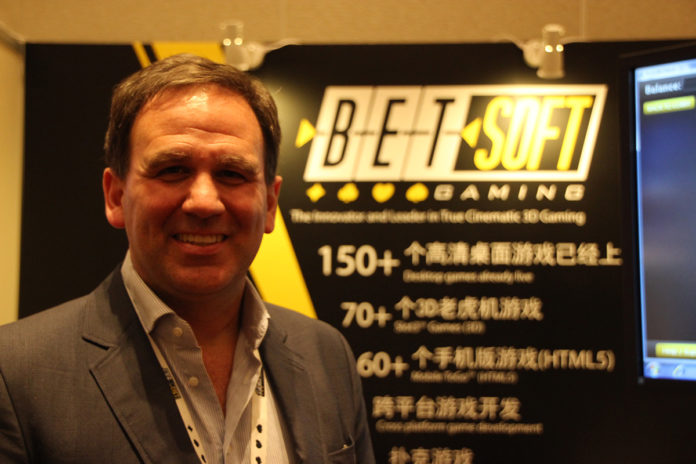Being the leader in cinematic and 3D content for online gaming,
Betsoft saw the advantages of expanding in to the Asian market,
explains the group’s Director Mark McKeown. Despite recent events
in Southeast Asia casting doubts on certain regulatory environments,
the expert is confident in the continued success of the region,
as well as online gaming, explaining how the group interacts
with clients and consumers alike.
Kelsey Wilhelm
[email protected]
There’s a huge difference between creating content for Western markets and Asian markets. How did Betsoft find the adaptation process?
Our roadmap of product even before we launched into the market had Asian-themed content because we thought it was cool. And that does play in the Western world. Since we’ve come to the market, the demands of the customer base has meant that we’ve had to increase it. And the issue now is just that when you make a single title, whether it’s Western or Asian themed, we still [make sure] it has the capability of working both markets, but players are quite different.
So it’s: do you take the one title and divide it in terms of some of the features? No, not really – you really want to build one title, because economically, to make it work you need to do it once. So it’s: how do you make it work across multiple cultures and multiple places? I’m talking beyond languages, I’m talking about spin features and entertainment factors. We probably put more entertainment into the Western version of the game, where we find Asia likes to get on with it, and for the spin reveal and for the experience to be quicker, faster, get to the point – am I a winner or a loser?
In terms of your products, some of the key words that resonate in your branding are ‘3D’ and ‘cinematic’. Why do you think these are so important?
I think initially it was because it really stood out, and in a crowded marketplace like you now have, it’s also a bar which competitors can’t reach, because the team that we have is so on fire at what we do. So in going into that particular design element, we can really deliver something that almost – if you’re looking at a board of games or looking across a website – you can pick ours out immediately. Which I think is a strong point. And the cinematic side of things is just that a lot of the people that work for us have come from a film background.
Where are those teams primarily based?
It’s a well-guarded secret. We really, really don’t quote or say. They are in many locations, we are agile in the way that we work and needless to say based upon time zone, production goes on around the clock. That’s about all I can say.
What about design elements – such as the number of claws on the dragon or tiger – was there a trial and error process you had to go through?
We really rely heavily on our clients to help with that. We are selling to operators who really know their player. We know players but nobody knows them better than themselves. So we have really strong relationships with them to ask them questions like that, and we broaden out our user testing to a group of people that input to the detail of these kind of things.
I was speaking recently about a game Fa-Fa Twins where we did the wrong colour eyes for the twins – as a kind of a green colour, it was completely culturally incorrect. And so we talk always about iterating a game. So a game, even after it’s released, is never finished. We’re constantly tweaking, touching, updating based upon feedback, the metrics for the game. That’s the beauty now of these back-offices. I can log into my phone right now and see details of what’s happened today, [or] three weeks [ago]. We launched Slot Father 2, a sequel to one of our most popular titles, just recently, and immediately that the game’s live, we can get an idea of numbers and what we need to do differently the next time.
How long does the process go on? Is it never ending?
Well the game settles down. The initial development process is between four to eight months. So it is a mini-feature film in size. Concept to delivery – and delivery being an eleven-step process.
Then it goes live and we see how it goes – we get the feedback. I think most of the time, at the point that we’re live, we’re not suddenly going to deconstruct the whole title, but there’ll be bits that get modified, tweaked. I think that is the beauty of the online world. Well it’s the beauty and the curse – you’re never done, you can always tweak.
Where would you see as primary online markets that you’ll be focusing on, and what are the advantages within those markets?
The business is very strong in Europe, it’s established licensing base is in Malta and has nearly 100 clients in that market. Three years ago we really had seen tremendous success from a couple of Asian clients, 188bet and some of the older ones, and it was just a glaring hole that we hadn’t actually attacked the market more, focused on it. It was a changing outlook on RNG (random number generator) games, as they call them, there was more trust. Initial times when we were coming here, people were like “Oh I don’t know if I trust the mechanic here, I’m being ripped off, these aren’t potentially honest games”. And based upon our level of testing of them, the certification processes that we go through, the regulatory processes, people start to believe in them, so that isn’t so much of an issue. We still face it, but it’s not as much of an issue. And so over the last two or three years, this has become the single most important market. I’m talking in terms of volumes, in terms of the projections that we put beside some of the European projects, because so many of them are like – if you’re licensed in the UK you can operate in the UK, it’s not UK and France, it’s just UK. Whereas the market here still means you can put a zero beside many of your projections in terms of success.
Within Southeast Asia, for the licensing process, it’s not a one-size-fits all. How does it work?
No, it’s not. It’s still really fragmented and that was a big subject matter for conversation in Manila (at the ASEAN Gaming Summit). A lot of people don’t know exactly where they stand with the licensing bodies, it’s a constant communication thing that’s going on. It certainly helps that our business has got the Malta license, but even for some of the places that we’re operating in here (Southeast Asia) that doesn’t really apply. And so it’s just a growing area; that it’s just changing so much, it’s hard to sum up.
What about the Philippines? Have President Duterte’s comments and actions affected your outlook for the area?
We don’t have an established office there. So the short answer is: we’re not as badly impacted as some of our colleagues are who are really at potentially having to leave the area, relocate. For us, it’s worrying because we’re part of a bigger ecosystem, there’s a hell of a lot of operators there. I just wish they could tax this stuff and get on with it and everybody could do well out of it. And I’m including the United States in that, all sorts of other areas, which are completely off limits at this time.
You promote very strongly that your group maintains a rapid release schedule. Has that changed at all since you expanded into Asia?
It maybe is more firmed up. By rapid release, we talked about the four to eight months to develop a title, we have six to eight titles going through the process at any one time, we commit to our 140 clients worldwide that we will deliver one new title to them a month. That’s what the rapid release means. We will do that across mobile and desktop simultaneously and we will provide all of the clients with advanced quarterly notice of all of the titles, dates for promotional materials, dates for actual release day.
It’s much like the film model. The movie, the game is going to come out on May the 22nd and because it’s so filmic we also do cool things like trailers and video accompaniment – so that gets plastered on social media. So players are really looking out for those titles; they want to touch them on the first day that they’re available, that’s something that they look forward to. And so we prioritise the release of them to the clients that are valuable to us and that we have valuable partnerships with to get it to their players.
In terms of promotions, is that handled primarily on their side?
We do our own about Betsoft. We have a Youtube channel, we have all of the Facebook and Instagram, Twitter feeds. But yes, I would say the best communication points to the customers are by the customers themselves to their clients.
How do you convince someone that the math behind the games is accurate and fair, given that they don’t see the back-end?
Our clients do. The player doesn’t. We publish the RTP (return to player) to the clients. And they’re theoretical and they’re usually between 92, 93, 94 per cent return. With millions of rounds of gameplay through the back-office we can then, after a period of time, show the clients: look it’s coming out within one tenth of one point of what we advised that it would.
Including the payout table, we also provide product sheets on every game to our operators, and it’s up to the operator to provide that information to their players, but they’re allowed to.
We’re not hiding anything, we’re totally transparent – we want people to know what they’re getting into.
In fact, we have a responsibility to not screw people over. We wouldn’t be in business if we were developing something that didn’t have a balance between entertainment, pay-out to player, but also profitability to the operator. We’re the man in the middle here – we want the player to have a good experience, without that we won’t get volume. But if it’s returning a 120 per cent to the customer, we also won’t keep that relationship with the client. So we’re the man in the middle.
How exactly does the licensing work?
It’s a perpetual license. By that I mean, by signing the license agreement they have rights to the entire back catalogue, which is about 150 games. And then we say to you, every month we’ll give you one new one, at least one new one. So it’s going to grow. So if we have 150 now, by the end of 2017 we’ll have 162 and you can choose to use 70 of those games or, we push you to use them all and position our games at the top of every one of your menus, because our games are the best. And then it’s up to a continual relationship between us, the account manager and the client to make sure that as each release comes out, as much is drawn from the title as possible.
Does that ever involve a percentage, based upon what the title you sold them is making?
We have one set of terms that we do in terms of our agreement with them for royalties that applies across most all the titles. Sometimes, with some of the other games, like baccarat or blackjack, we might offer slightly different terms, but for the most part it’s one set of percentages that apply to the vast majority. We just keep it simple, otherwise it becomes quite a mathematical computation.
Is that division based on skill-based games?
Skill-based games goes into an area that I think is different from any of these games. I guess some people feel as though there is more skill involved in them than others – table games – there is more, yes. I would say with table games there can be a different set of percentages there, because a lot of the land-based people expect those to be quite different than the slots. Probably with some of the online operators there’s less of a requirement for that. But if we’ve done a deal with a land-based company who has recently gone online, they’ve got a very old-school mentality about how they expect it. And they also probably have a player base that will play the games differently than an online slot player would play a table game.
How interested are you in social gaming?
The games are used for fun, free to play. The same real-money games can be applied to a social gaming experience. They have worked very well in that environment. Recently it’s dropped off. I don’t know if it’s saturation or what it is. There’s been a couple of interesting discussions with a couple of new social gaming platforms. We haven’t given up, but it’s not our main focus.
Would that be a similar type of licensing agreement?
It can be based upon the number of tokens that are purchased, taking a percentage of that. It can be different models too – we can say here’s the entire catalogue and here’s some kind of not one-off fee, but monthly fee for its use. It is done a little differently sometimes.
What about Japan?
Well, we are going to go over to the Tokyo show in May and we’re going to take a look. We are getting requests for discussions with people there that are going to do some things online. But no, we don’t have a set position or policy on that.
Right now they’re going for the integrated resorts model. Do you think that’s going to include the online side also?
I don’t know. I doubt it. It’s such a funny market. It’s ripe for it, but I sometimes just don’t understand – there’s so much politics in all of these. The U.S. one is fascinating. My outlook with all of them is just bring taxes into it and everybody wins. Particularly there’s a land-based lobby that don’t want any of this. But my big statement, as I said from the start, is that if I see the casinos and the downturn in the market when I’m in Macau, I think that’s a good thing for my business. People aren’t going to stop gambling. They might stop doing it in the Venetian, or Wynn, but they’re going to still be doing it online somewhere. They’re doing it in China, we know that. And the Japanese are no less tech-savvy and no less interested in gambling. Neither are the Indians.
So it’s going to come, it’s just a long game. I started working in gaming in 2000 and I thought that was going to be a short-term thing, and it’s 17 years later and it’s now a career.
If the lobbyists for the land-based casinos don’t manage to keep everything at a standstill, do you see that online gaming will take over – at least in terms of revenue – from land-based casinos?
I’m staggered by the profit levels and the numbers from a place like Macau. It’s insane. So I don’t want to try to pitch online necessarily. I’ve never actually done the study, but I do know for instance Macau land-based is worth Vegas, Monte Carlo and Atlantic City combined. I gotta think, based upon the number of households in the world, that online can dwarf land-based, with respect to land-based. But it’s got to. Just pure logic maths would suggest that – casinos never close, it’s just a different model.
























